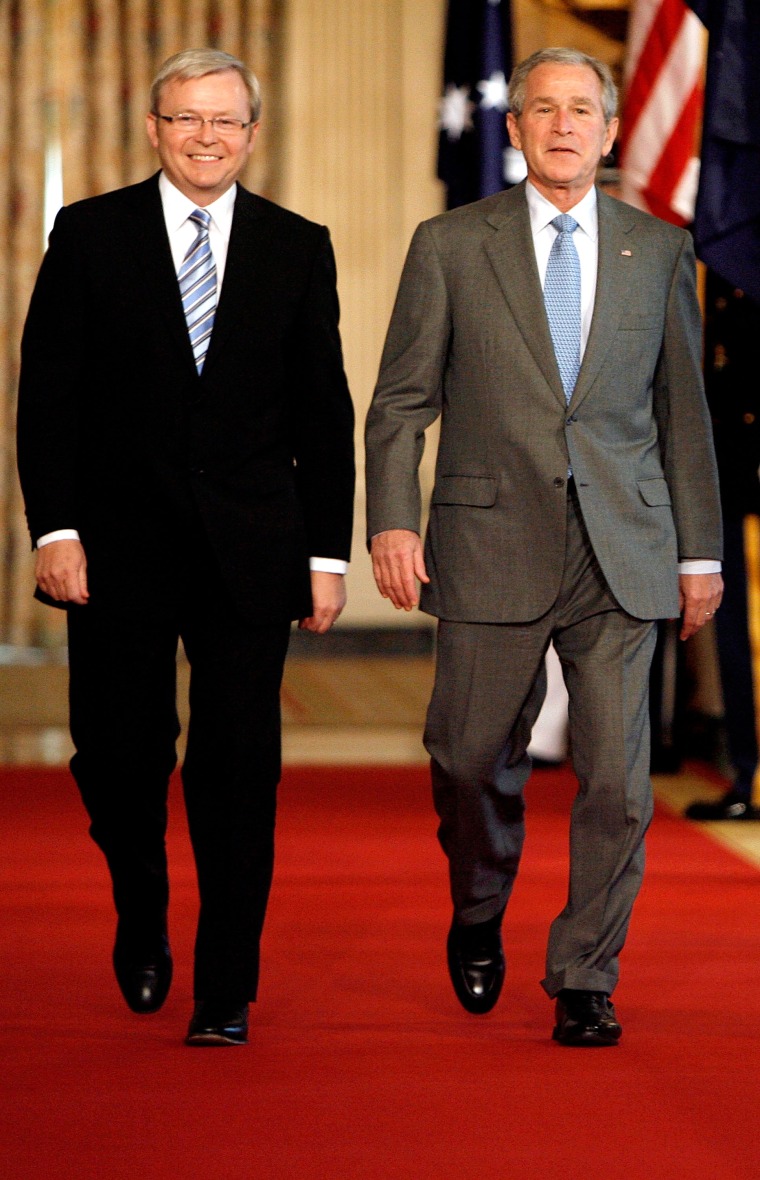President Bush says that close U.S.-Australian ties will continue under new Australian Prime Minister Kevin Rudd's leadership.
It's a pledge made in the face of fundamental differences between the two men when it comes to Iraq strategy and commitment.
The new Australian prime minister campaigned on a theme of withdrawing Australian troops from Iraq. Bush brought up Rudd's Iraq stance himself during in his opening remarks.
Asking and answering his own question, Bush said he expected a journalist to ask him, "Aren't you mad at the prime minister for fulfilling his campaign pledge? The answer is no."
"I always like to be in the presence of somebody who does what he says he's going to do ... Here's a guy who meant it ... He consulted closely with his friends. His military commanders consulted closely with our military commanders," Bush said.
The president noted, however, that Australia continues to have troops in Afghanistan and is helping to train Iraqi farmers in dry-land farming.
For his part, Rudd said, "We're in Afghanistan for the long haul."
Australia has said it will not shrink its 1,000-soldier deployment to the country.
As for Iraq, the country says it plans to withdraw its 550 combat troops from that war zone.
The two leaders also discussed the ongoing tensions between China and Tibet
Both are urging China's leaders to meet with the Dalai Lama over violent unrest in Tibet.
"It is absolutely clear that there are human rights abuses in Tibet," Rudd told reporters after his meeting with Bush at the White House. "It's clear-cut; we need to be upfront and absolutely straight about what's going on."
Bush said he told Chinese President Hu Jintao this week that "it's in his country's interest" that top Chinese leaders meet with representatives of the Dalai Lama, Tibet's exiled spiritual leader.
"We urge restraint," Bush said.
Rudd is a China expert who wants stronger economic ties with Beijing. He said he would raise the issue during his visit to China next month.
Earlier, House Speaker Nancy Pelosi, a longtime critic of China's human rights policies, said it would be wrong to boycott the Beijing Olympics.
She said in a statement that while the Chinese government has failed to live up to its commitments to improve human rights conditions in China and Tibet, "I believe a boycott of the Beijing Olympics would unfairly harm our athletes who have worked so hard to prepare for the competition."
The California Democrat, who has long contended that expanded trade and political ties to China should be tied to improvements in Beijing's human rights record, said she believed the International Olympic Committee made a mistake in awarding the 2008 summer games to China and sponsored a resolution at the time expressing that view.
She said the Olympics should provide an opportunity for free expression and that she supported the rights of individuals and groups to make their views on China known when the Olympic torch passes through San Francisco next month.
Pelosi drew fire from the Chinese for her visit with the Dalai Lama in India last week for discussions on the suppression of anti-Chinese disturbances in Tibet.
"As I said in India last week where I met with His Holiness the Dalai Lama, if freedom-loving people throughout the world do not speak out against China's oppression in Tibet, we have lost our moral authority to speak out on behalf of human rights anywhere in the world," she said.
